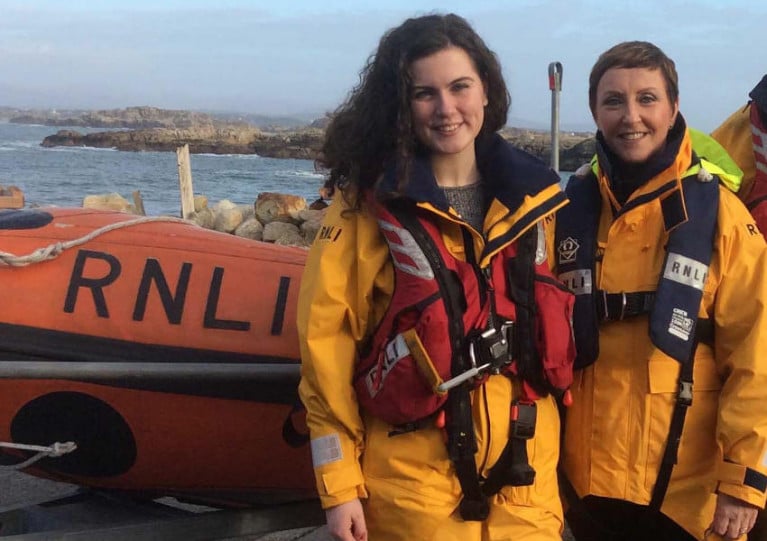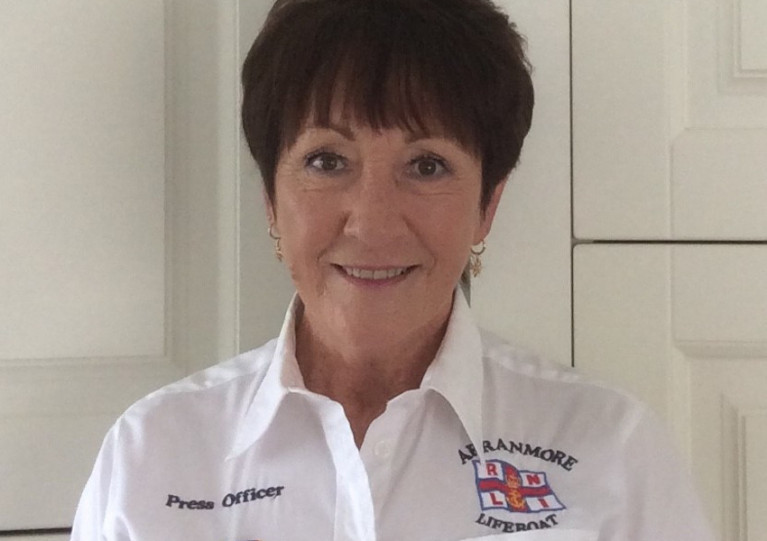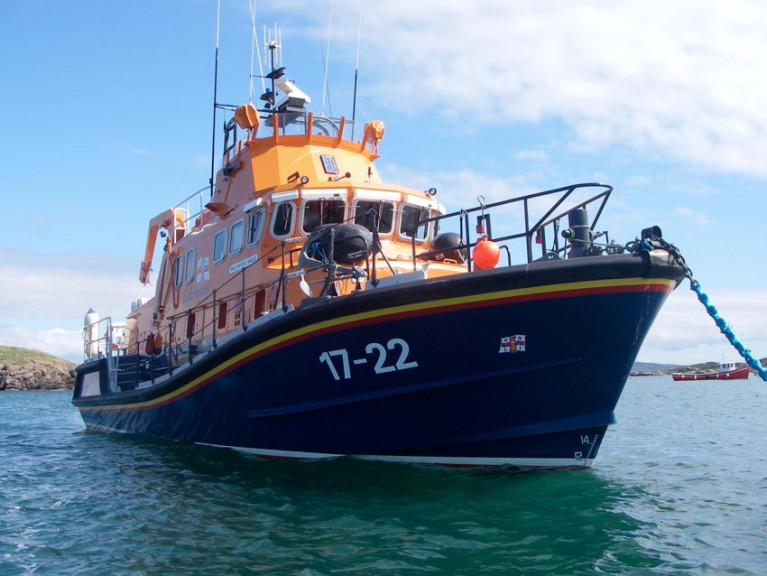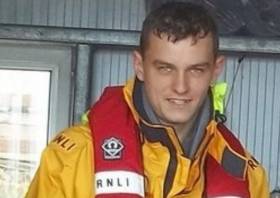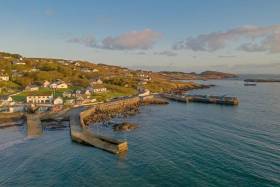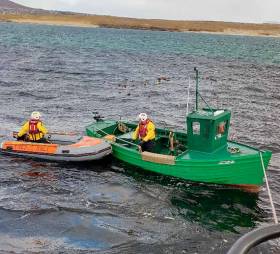Displaying items by tag: Arranmore
Early Morning Callout for Arranmore Lifeboat to Assist Fisherman Adrift Off Calf Island
Arranmore RNLI responded to a call at 7.15am on Wednesday morning (10 August) to assist a 25ft fishing vessel with one onboard after it sustained engine trouble.
The boat was drifting on to rocks at Calf Island which is located just metres from the Arranmore lifeboat station on the island off mainland Donegal.
On reaching the location, the lifeboat volunteers found that a neighbouring boat had secured a tow rope to the casualty vessel. The all-weather lifeboat escorted both vessels to Burtonport on the mainland.
Following the callout, RNLI relief coxswain Sean Curtin said: “We were delighted to be able to assist the boat and really pleased that they did the right thing in not delaying calling for help.
“We are a 24-hour rescue service operating 365 days of the year and we encourage the public to familiarise themselves with the safety messages from the RNLI which can be found by logging on to rnli.org/safety. We are always happy to respond to calls for assistance day and night.”
18-Year-Old Dies in Drowning Tragedy Off Donegal Island
RTÉ News reports that an 18-year-old man has died by drowning off the island of Arranmore (Árainn Mhór) in Co Donegal after getting into difficulty while swimming.
The incident occurred on Monday afternoon 3 January at the beach at Leabgarrow (An Leadbh Gharbh) shortly before 3pm, according to the Donegal News.
Despite the best efforts of emergency personnel, the casualty was pronounced dead at the scene and the body has been taken to Letterkenny University Hospital pending a post-mortem.
Grandson of Donegal Coxswain Recognised for Gallantry During WWII Returns From Boston to Join Arranmore’s Lifesaving Crew
The grandson of a distinguished Donegal coxswain, who was awarded the RNLI’s Gold Medal for Gallantry for his role in the rescue of 18 crew on a Dutch steamer in 1940, has returned home from Boston to become the third generation in his family to join Arranmore island’s lifesaving crew.
Mark Boyle was born and raised on Arranmore, but this will be his first Christmas on call for the RNLI after he was quickly recruited upon his family’s return to the island from America last April.
Mark follows in the footsteps of his late father Charlie, a former station mechanic spanning three decades, and his grandfather Jack, who was recognised for his bravery for a rescue during the Second World War.
Almost 81 years ago to the day, Jack and his crew rescued 18 people on the Dutch steamer Stolwijk of Rotterdam on 7 December 1940.
The Stolwijk was one of a convoy of ships from America which had come through three days of a rising northwesterly gale and was making for the passage between Scotland and Ulster, in mountainous seas and a hurricane of wind and snow, when it was forced onto rocks at Inishbeg.
Its crew’s rescue by Arranmore RNLI’s lifeboat crew was later recognised as one of great daring gallantry and endurance, carried out in weather of exceptional severity.
While Mark is delighted to be carrying on the family’s lifesaving tradition, he says his reasons for joining the lifeboat crew run deeper than just that.
And now as the RNLI continues its Christmas Appeal, Mark is urging people across Donegal — home to three lifeboat stations at Lough Swilly, Arranmore and Bundoran — to help his fellow crew, and the thousands of other volunteer crews carrying a pager over the festivities, to continue their lifesaving work at sea.
‘I know there will be thousands of volunteers like me wearing pagers and ready to drop everything at a moment’s notice and rush to the aid of someone in trouble on the water’
“I was born and raised on the island and spent my early years fishing lobsters, salmon and working on local white fishing boats,’ Mark said. “I then went to college and worked in Galway for 20 years before I moved to Boston for seven years.
“I returned home to the island with my wife and two of my three children in April and while it was always my intention to join the lifeboat crew when I came home, Tony Ward, the lifesaving operations manager, beat me to it and asked me to join before I got the chance to make the ask myself, which was lovely.”
Mark, who works in engineering as a head of operations for Irish Pressings, travels from the island to Bunbeg daily but when he is not working away, he is carrying his pager.
“The family connections are important but for me becoming a crew member runs deeper than that. It is about the sense of community and that is what the RNLI is all about,” he said.
“I spent the first three months on my return fishing which for many here is how they make their livelihoods, on the water.
“The lifeboat provides the vital service to those in distress at sea and that is always acutely felt by those living on the island. It is an added benefit for me that as a new crew member I am continuing in the family tradition.”
This Christmas Mark will be prepared to leave his loved ones behind to answer the call, each time hoping to reunite another family, and see those in trouble at sea safely returned. Over the past decade, RNLI lifeboats have launched over 1,200 times during the festive period.
But these rescues would not be possible without donations from the RNLI’s generous supporters, helping to fund the essential kit, training and equipment needed by lifeboat crews all year round.
“This is my first Christmas as a crew member with the RNLI,” Mark added. “I know there will be thousands of volunteers like me wearing pagers and ready to drop everything at a moment’s notice and rush to the aid of someone in trouble on the water. At this time of year, the weather is at its worst and lives are on the line.
“We know that every time our crews go out to sea, they hope for a good outcome, but sadly this sometimes isn’t the case. We hope that this year’s Christmas Appeal will show people just how tough it can be, but also that with their help we can get so much closer to our goal of saving every one.”
To make a donation to the RNLI’s Christmas Appeal, visit RNLI.org/Xmas
And listen to Tom MacSweeney’s latest podcast which discusses the RNLI’s investment in the Arranmore lifeboat.
Bundoran RNLI in Co Donegal were requested to launch on Tuesday evening (8 June) to reports of two paddle boarders being blown out to sea off Mermaid’s Cove in north Co Sligo.
The emergency call was made just after 6pm to Malin Head Coast Guard who immediately paged the Bundoran lifeboat volunteers. Within minutes the inshore lifeboat William Henry Liddington set off with four crew on board.
The Sligo-based Irish Coast Guard helicopter Rescue 118 was also tasked to the scene, where the lifeboat crew assisted the two paddle boarders back to shore and assessed their wellbeing.
Lifeboat helm Brian Gillespie said later: “We were glad to be able to bring the paddle boarders back to safety and the person on the shore called 999 when they did.
“We would always remind people that if they see anyone in trouble on the coast to call 999 or 112 and ask for the coastguard, and for paddle boarders to be mindful of offshore winds which can catch people out very easily.”
Elsewhere in Donegal, Arranmore RNLI’s all-weather lifeboat was called on Sunday afternoon (6 June) to assist a RIB which got into difficulty on rocks off Kincasslagh.
 Arranmore RNLI’s all-weather lifeboat | Credit: RNLI/Arranmore
Arranmore RNLI’s all-weather lifeboat | Credit: RNLI/Arranmore
When the lifeboat arrived on scene, the Bunbeg Coast Guard boat had secured the casualty boat and brought it to safety.
Arranmore volunteer’s busy weekend also saw a callout on Saturday (5 June) for a medevac from the island. The patient was transferred to a waiting ambulance at Burtonport.
Frankie Bonner, second coxswain, said: “We are a 24-hour on-call service and prepared at a minute’s notice to answer any call for assistance.
“Our callouts are many and varied, from providing medical assistance in transferring patients from the island to assisting boats and people in trouble within a 50-mile radius of our base in Arranmore.”
Frankie is the son of Francis Bonner, who served as coxswain on the lifeboat for many years along with his three sons Frankie, Seamus and Michael, who are part of the volunteer crew at Arranmore RNLI.
There is still a strong family tradition of voluntary service at Arranmore RNLI since the first lifeboat came to the island in 1883.
Since Sir William Hillary founded the RNLI in 1824, women have had a role in the service — initially working in the background by helping to launch and recover the lifeboats, fundraising for the voluntary service and supporting their husbands and sons when the lifeboat went to the rescue.
Today, women are taking their place at the forefront of the RNLI, serving as crew members, leading fundraising campaigns and of course still supporting their family who crew the lifeboats.
Arranmore RNLI off mainland Donegal was founded in 1883 and although it was only men with a knowledge of the sea who crewed the lifeboats, without the support of their female family members they would have had difficultly manning the vessels while looking after young families.
The women of Arranmore were always very resilient, from dealing with the hardships and tragedies of island living in their every day lives, to playing a vital role in supporting the lifeboat families when the crew were responding to a difficult rescue in horrendous weather conditions.
An example of the type of rescues the Arranmore RNLI were involved in was in December 1940, when they rescued 16 crew members of The Stolwyjk in the most challenging weather conditions. The crew were awarded gold, silver and bronze medals for the very memorable rescue.
Today, as in every lifeboat station throughout Ireland and the UK, Arranmore RNLI is proud to have women crew members. Lifeboat press officer Nora Flanagan was the first woman to join the Arranmore RNLI crew, and four more women have since joined the crew in this vital lifesaving service.
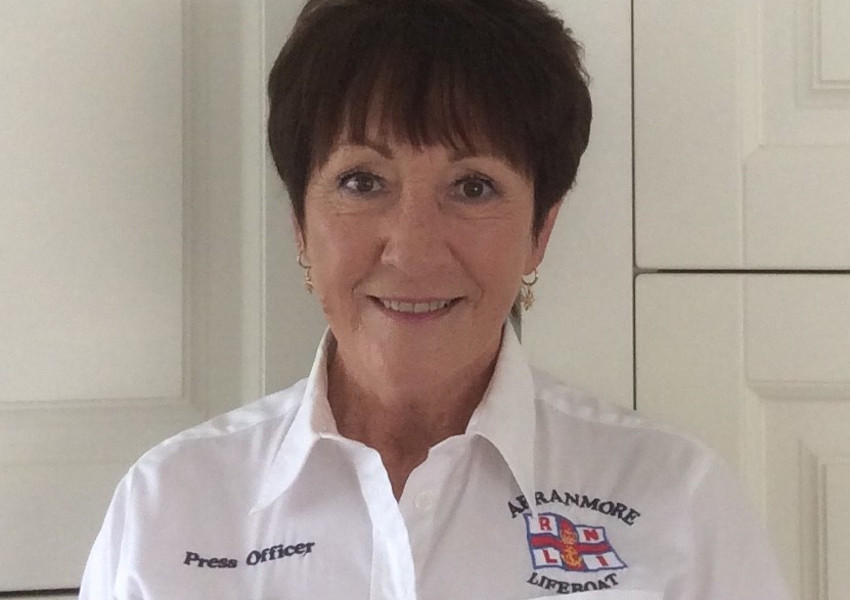 Nora Flanagan was the first woman to join Arranmore RNLI’s crew | Photo: RNLI/Arranmore
Nora Flanagan was the first woman to join Arranmore RNLI’s crew | Photo: RNLI/Arranmore
These women are Karen McGowan, a registered advanced nurse practitioner in Beaumont Hospital and president of the Irish Nurses and Midwives Organisation (INMO); round-the-world sailor Sharon O’Donnell; Erin McCafferty, a student at NUI Galway; and primary school teacher Aisling Cox.
Karen McGowan joined the Arranmore RNLI crew at age 17 and continued to serve throughout her nursing training. Speaking to Karen about why she joined the RNLI, she said: “I enjoyed the adrenaline rush and I knew I wanted to train as a nurse; as a crew member on the lifeboat I gained a huge amount of experience with the excellent training the RNLI provides. Dealing with medical emergencies on a callout served me well in my student nurse training.
“I had quite a few memorable rescues during my time as a crew member but the most poignant was rescuing the crew of a sinking trawler. As soon as the crew were brought on board the Lifeboat the trawler sank very quickly. It was very hard to watch somebody’s livelihood sink beneath the waves and witness the raw emotion on the faces of both the lifeboat and the trawler crews.
“I would encourage anybody to join their local RNLI, it really helps you think outside the box and the crews are very supportive and helpful to new recruits”.
All crew members are required to serve a probationary period where they learn all the skills involved in saving lives. Learning is competence-based and crew members must prove their competency in one skill before taking on another. This training enables all volunteers, many of whom have little or no knowledge of boats or the sea, to become first-class lifesavers.
The first RNLI women’s award was to honour Grace Darling, a lighthouse-keeper’s daughter who helped rescue nine people in 1838.
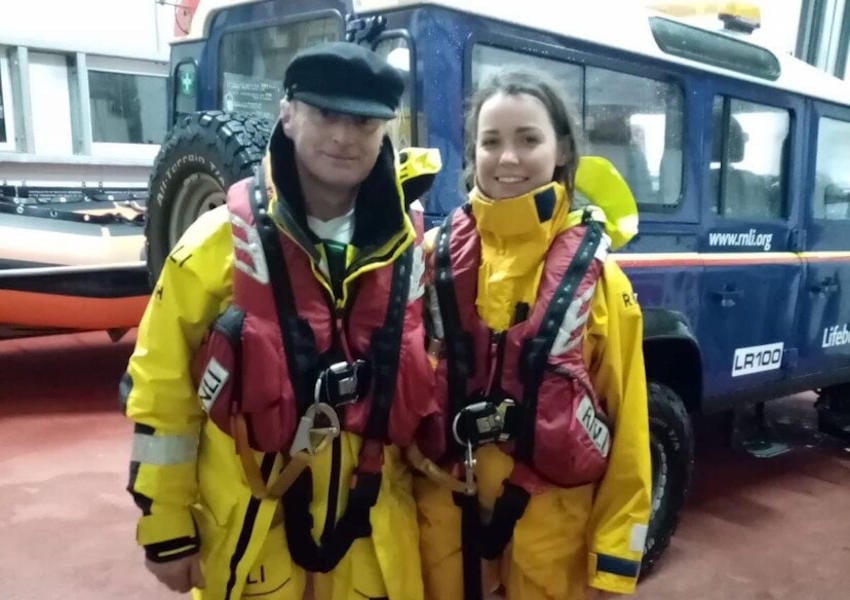 Aisling Cox with her dad and fellow crew member Kieran | Photo: RNLI/Arranmore
Aisling Cox with her dad and fellow crew member Kieran | Photo: RNLI/Arranmore
Voluntary fundraising committees are an essential part of the RNLI and women are very much to the fore in raising funds to keep the lifeboats afloat.
As the charity celebrates International Women’s Day, it salutes the selflessness and dedication of the many women of the RNLI involved in saving lives at sea.
Grace Gallagher has been a member of the Arranmore fundraising committee for over 25 years. She has been honoured and recognised by the RNLI as the longest-serving member of the fundraising committee and has raised thousands of euro for the RNLI.
Grace said: “I can’t believe I’ve been fundraising for the RNLI for over 25 years. Living by the sea and with many of our families involved in the fishing industry, we rely on the lifeboat and the contribution of the public to continue with this essential voluntary service. It has been a pleasure to be part of it.”
Other remarkable women connected with Arranmore RNLI include Sadie Bonner, a former postal worker who started supporting the RNLI by collecting fundraising buckets from shops and selling badges, and who is now treasurer of the fundraising committee; and Arranmore RNLI station president Majella O’Donnell.
Arranmore Lifeboat Volunteer Recognised For Quarter-Century Of Service
Arranmore RNLI volunteer Nora Flanagan has been recognised for 25 years of service to the charity that saves lives at sea.
The retired nurse, who serves as the Donegal island station’s press officer, first got involved with the RNLI in 1995 when she became the first female crew member to join Arranmore’s all-weather lifeboat crew.
“I remember my first call out well,” Nora recalls. :We were involved in an all-night search for a fisherman who fell overboard a trawler and I remembering finding that challenging.
“The next day my pager went off again, this time for a medical evacuation. I was more confident on this callout when I was helping the injured person. It was then I realised and understood that there is a role for everybody who wants to join a lifeboat crew.”
Nora also got involved with the local fundraising team and later became the station’s volunteer lifeboat press officer, a role she still holds.
“This involves writing news releases and doing local radio interviews after callouts and keeping in touch with the local media about any activity that is going on at the station such as safety awareness and education, fundraising and events.”
One of the highlights over the years was a visit to the RNLI College in Poole, where Nora was asked to represent the RNLI in Ireland for the launch of Volunteer Spirit, a lifeboat which was funded by selling badges.
“That was a huge honour for me personally, but overall, I have had an exceptional 25 years with the RNLI and I love being part of an organisation that is one big family.”
Due to the coronavirus pandemic, Nora could not be presented with her medal in person but said she was delighted to receive the recognition from the RNLI, which came with a warm word of thanks from the charity for having achieved over 20 years of extraordinary service.
Arranmore Lifeboat Rescues Two After RIB Difficulties
Two people were rescued by Arranmore RNLI’s volunteer crew in Co Donegal after reports of a RIB in difficulty over the weekend.
The all-weather lifeboat launched on Saturday (1 August) and headed south to the scene in the Portnoo area, where they found one person in the RIB and recovered another from the water before giving casualty care.
A tow was established to bring the RIB to Portnoo where an ambulance was waiting to take the casualty to hospital for further treatment.
This was the first callout for the Arranmore lifeboat crew since March, when coronavirus restrictions were imposed.
Lifeboat coxswain Jimmy Early said: “As there is now an increase in visitors to the Wild Atlantic Way, we would remind people to be fully aware of the RNLI’s water safety messages.”
Arranmore RNLI Pays Tribute To Lifeboat Volunteer Who Died In Pier Incident
Arranmore RNLI has paid tribute to lifeboat volunteer Lee Early, who died on Sunday (17 November) after an incident at a pier on the Co Donegal island.
TheJournal.ie reports that Early (26) and another man, who survived the incident, were in a car that slipped off the pier into the sea around 5.10am.
It’s believed they had been trying to turn the car on the pier when the accident occurred.
Early’s remains were escorted back to Arranmore yesterday evening (Monday 18 November) ahead of his funeral scheduled for noon tomorrow at St Crone’s Church.
“He was a proud Lifeboatman, a skilled Skipper and a much loved friend to us all, he will be greatly missed by the whole community,” the lifeboat team said in a statement on Facebook.
“The Arranmore Community & diaspora, along with the RNLI and wider SAR community will stand with the Early family at this difficult time. Ar dhéis Dé go mbeidh a anam dilís.”
The community of Arranmore is appealing to people around the world to consider bolstering their numbers on the island off Co Donegal.
The Gaeltacht island, northwest of Dungloe, recently became Ireland’s first offshore digital hub thanks to Three Ireland’s mobile broadband project.
And it’s hoping to use the benefits of that connectivity for remote working to attract people — and especially families — from as far afield as the United States and Australia to relocate there, as Lonely Planet reports.
Arranmore Lifeboat Rescues Fisherman After Boat Runs Aground
#RNLI - Arranmore RNLI in Co Donegal assisted a fisherman who got into difficulty off Gola Island at the weekend when his small boat ran aground on rocks.
The all-weather lifeboat was called out at 11am on Sunday 18 March and proceeded to Gola Island to assist the casualty.
On arrival at the scene, the Irish Coast Guard helicopter Rescue 118 from Sligo and the Bunbeg Coast Guard boat had lifted the fisherman from the boat.
The casualty was subsequently transferred to the lifeboat, where he was treated for mild hypothermia.
The lifeboat stayed at the scene until the tide turned before the volunteer crew then secured a tow rope to the boat and transferred both the fisherman, who was fully recovered, and the boat to Bunbeg Harbour.
Speaking following the callout, Arranmore RNLI coxswain Jimmy Early said: “Although it was quite windy, the sea was calm but the wind chill factor was approximately 1-2 degrees centigrade which accounted for the hypothermia.
“Once we treated the fisherman, he made a full recovery and was thankful to all the rescue services for their help.”


























